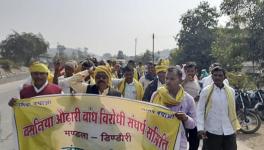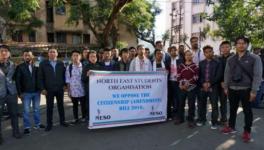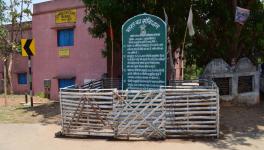Revisiting Coal Bearing Areas Act, 1957: Snatching Consent of Adivasis?

Image credit: The Leaflet
In October last year, the Chhattisgarh government, through a letter, urged the Union Ministry of Environment, Forest and Climate Change to cancel opencast coal mining in Hasdeo Aranya forests. Before this, the High Court of Chhattisgarh, in the case of Dharam Singh Korram & Ors. versus Union of India & Ors. had, in May 2022, dismissed the petitions of Adivasis from the Parsa coal block situated in the Hasdeo Aranya region. The case was regarding land acquisition done under the Coal Bearing Areas (Acquisition and Development) Act, 1957 (CBA Act), having implications on the rights of Adivasis living in the Hasdeo Aranya forests.
While the very constitutionality of the CBA Act is contentious, in this piece we will discuss the less-talked-about issue of the consent of Adivasis in scheduled areas during the acquisition of Adivasi lands.
In 2021, several criticisms were made against proposed amendments in the CBA Act on the grounds that they would make the land acquisition of Adivasis easier and provide more control to private corporations. In reality, the CBA Act, since its inception, has never been fair to Adivasis, given that it undermines their consent and violates their autonomy.
A report by international human rights organisation Amnesty International found that an Adivasi man from Padaniya village of Chhattisgarh claimed that the villagers did not receive any communication regarding the acquisition of their land. The report also found that affected families were not informed directly about the government’s intention of acquiring land, and over a third of residents in this village were not formally literate.
The same issue of not receiving communication for land acquisition was also raised in Dharam Singh Korram, wherein Adivasis in Fatehpur village claimed that notice regarding the acquisition was not personally served, indicating that they were unaware of the land acquisition.
Both these instances lead us to ask a pertinent question, which is: where is the informed consent of the Adivasis from whom the State is acquiring the land? These are just two instances but in reality, since 90 per cent of coal is in Adivasis areas or majorly located in Schedule Five areas, there is a huge possibility that Adivasis do not get proper information regarding land acquisition vitiating their free, informed and prior consent.
Problems with the Coal Bearing Areas (Acquisition and Development) Act, 1957
Absence of requirement of procuring consent
The CBA Act under Section 4(1) provides that when the Union government is certain that coal can be obtained from a particular area, then it can declare an intention to acquire that specific area through an official notification in the government gazette, and this is the first step towards the acquisition of land. Section 7 of the Act provides that in the event there is satisfaction on the part of the Union government that coal can be obtained from the land notified under Section 4(1), a notice of intention to acquire the land may be notified within two years. The rights over the land would be absolutely vested in the Union government once the publication of the declaration is completed, as per Section 9.
It can be inferred that as per these provisions, there is no necessity to take informed, prior and free consent of the affected communities or individuals. While one can argue that Section 4(1) is only with regard to the intention to acquire land and not the acquisition of land, and Section 8(1) provides for a 30 days’ objection period, the fact that this intention to acquire the land is without the consultation of the communities or Adivasis is like the imposition of a king’s decree in a democracy. The publication of intention through the official government gazette without consultation with the affected individual is simply the imposition of decisions on Adivasis.
The existence of such a law in a democratic society is anti-Adivasi and undermines the consent of Adivasis. The consent or consultation part ensures that affected individuals or communities have a choice in the decision-making with regard to the proposed land acquisition. It should be left up to the affected individuals to determine the acquisition of land and their own ‘development’. The absence of consent in the first step makes the whole land acquisition procedure exclusionary and unilateral.
When we look at other disciplines such as medicine, the power of consent is enormous. Medical science runs on the principle that every individual of sound mind has the right to decide the fate of their own body. Consent in medicine has developed to the extent that consent leads to the treatment of a patient, and consent leads to withdrawal of treatment. Applying the same logic, the consent of the Adivasi would permit the State to use or not use their land.
In case of consent violation, a medical patient can take legal action against medical professionals. As we go deeper, the concept of ‘informed consent’ becomes complex in medicine. The landmark judgment of the California Court of Appeals in Salgo versus Leland Stanford Jr. University Board of Trustees (1957) created ‘informed consent’ by establishing that physicians have an obligation to reveal any information which forms the core of intelligent consent of the patient in deciding whether they want to take proposed treatment or not.
In Gray versus Grunnagle (1966), the plaintiff argued before the Pennsylvania Supreme Court that consent was not informed as he was unaware that something additional needs to be performed with surgery and no information was provided about the risk of paralysis. The court observed that consent is required to be accompanied by deliberation.
In contrast, even basic consent for land acquisition is not taken from Adivasis. The CBA Act does not consider informed consent and autonomy of the Adivasis. It merely provides for the notification of land acquisition and hence ignores the socio-economic status, educational status, and various other barriers that may be faced by original landowners. Laws such as the CBA Act have set the threshold of consent for obtaining Adivasis’ land abysmally low, which violates the autonomy of Adivasis. Land and forests are equivalent to life and death for Adivasis, and thereby the level of consent in the case of the land acquisition process needs to be developed as consent in other disciplines has evolved. The State can ensure the autonomy of Adivasis by giving them the right of informed consent.
Meaningful notice?
The CBA Act further, under Section 8 states that anyone who has an objection to the acquisition of land and whosoever is entitled to claim compensation shall file complaints in writing within 30 days of the notification of acquisition in the office of the Coal Controller. The notice of acquisition as per Section 24 of the Act is provided through the official gazette if it affects a number of individuals.
While the Act provides for the publication of notice through an official gazette in the locality, the pertinent issue here is that the Act presumes a certain level of literacy from the people whose land is being acquired by the government. But the fact is that most of the places where land acquisition for coal mining and acquisition of land takes place are tribal areas where most of the people are illiterate, and presuming that Adivasis would get notified by reading the gazette from the internet or newspaper cannot be termed as proper notification. The Adivasis herein need to be properly informed about the fate of their land.
For example, in Dharam Singh Korram, the Chhattisgarh High Court rejected the contention of the Adivasis that notification under Section 7(1) was not served, stating that notifications under sections 4(1) and 7(1) notifications had affected a large number of individuals and hence, as per Section 24, there is no requirement of serving notice personally.
Serving notice to affected individuals through a gazette is a highly elitist and exclusionary practice. Such a practice indirectly leads to the problem of access to necessary information for the Adivasis. While it can be argued that the technological revolution has bypassed issues of information access, there are still villages in India that need proper internet connection and hence, access to this sort of information is distant. Thus, the presumption that a notification released through a gazette would lead to proper dissemination of information regarding land to the affected individuals is flawed and elitist.
Ironically, the government spends considerable monies on advertising welfare schemes, but when it comes to acquiring the land of Adivasis, the government does not put in the bare minimum efforts to provide information about the acquisition of their land with which Adivasis enjoy various types of spiritual relationships. The information of land acquisition must be disseminated to everyone whose land the State is going to acquire for ensuring free, prior and informed consent from Adivasis in a participative democracy and thereby leading the way for the autonomy of Adivasis.
Violation of international law norms
The CBA Act also violates several international laws that safeguard indigenous rights, which India has ratified. The International Labour Organization’s Indigenous and Tribal Populations Convention, 1957 recognises indigenous people’s right to hold their traditional land. India has also extended support to the adoption of United Nations Declaration on the Rights of Indigenous Peoples (UNDRIP), which gives obligates States to ascertain tribal land rights, developing a system for the demarcation and titling of the land, and provide proper compensation for the lands which have been taken without consent. The pertinent point is that the right of tribal people to free, prior and informed consent, recognised under the UNDRIP, is being blatantly violated by the CBA Act.
Conflict with other statutes
Subsequent to the passing of the CBA Act, several new legislation in conflict with it have been passed which have been strictly interpreted by the court, contrary to the intention of the new laws. For instance, the Provisions of the Panchayats Extension to Scheduled Areas Act, 1996 (PESA Act) provides power to the gram sabha for the approval and consultation of any village-level developmental projects. But there are loopholes in the law that are used to undermine the consent of Adivasis.
In Dharam Singh Korram, the Chhattisgarh high court held that the PESA Act does not apply to major minerals, as reflected by Section 4(k) of the Act, but this interpretation does not align with other rights under the Act, such as approval of plans for social and economic development by gram sabha under Section 4(e), and consultation of Gram Sabha before acquisition of land in the Scheduled Areas under Section 4(i) of the PESA Act. These two subsections do not discuss minor and major minerals, and can be made applicable for taking consent of the gram sabha. Hence, it can be inferred that approvals and consultations from the gram panchayat should be taken for any developmental project. However, the high court still goes on to say that the PESA Act does not apply to major minerals, leading to the marginalisation of and undermining the consent of Adivasis.
The Scheduled Tribes and Other Traditional Forest Dwellers (Recognition of Forest Rights) Act, 2006 (FRA) recognises and vests the forest rights of forest-dwelling Scheduled Tribes and other traditional forest dwellers. The Act also provides them the right to live in the forests for livelihood. Several additional rights such as ownership and access to collect are provided by the FRA.
In Dharam Singh Korram, the Adivasis argued that they have community rights over the forest area and the same is not in accordance with the CBA, but the court, by looking at the Supreme Court’s judgment in Orissa Mining Corp. Ltd. versus Ministry of Environment & Forest & Ors. (2013) observed that the FRA never took away the right of the State over minerals which are lying beneath the forest land and which is vested with the State.
This creates a problem as the FRA is a special legislation which provides several rights to forest-dwelling communities, but the State can violate the Adivasis’ forest rights as per the observation of court in this case. The court left the question of whether the CBA Act would prevail over the FRA or not unanswered.
It can be observed that while courts have given landmark judgments, such as its 2007 Niyamgiri verdict protecting the cultural rights of Adivasis, they have at other times also interpreted laws in an anti-Adivasi manner, which has given the go-ahead to land acquisition projects, and has enabled the taking away of land and forests from Adivasis by the State.
The way ahead
The CBA Act was enacted in 1957 to gain hold over the country’s coal. It plainly dehumanises Adivasis, undermining their consent. Under the garb of economic interest of India, the State has been using this inhumane law to acquire land for coal mining. Most of the land acquisition happens for coal mining, and using the CBA Act for the same is to escape from the objections that could be raised.
The CBA Act is a draconian law that violates the autonomy of Adivasis across the country. When land is acquired through the CBA Act, the autonomy and consent of Adivasis are snatched by the State.
In the past few decades, a high standard of consent has emerged in various disciplines; taking inspiration from those disciplines, high standards of consent need to be developed when land acquisition is done as well.
Most of the coal mining is done in Adivasi areas, and thereby Adivasis are mostly affected by this draconian law, which doesn’t even seek free, informed and prior consent. There is a need to take dissemination of information, the socio-economic status and educational status of the landowners, and various other factors into consideration when the land acquisition takes place.
The Union Ministry of Law and Justice must review the CBA Act and repeal this colonial-minded Act. There is a need for a better law that ensures participatory democracy during land acquisition — a law that would provide dignity and autonomy to Adivasis while acquiring their land.
Shekhar Kanwar is an undergraduate law student at the NALSAR University of Law, Hyderabad.
Courtesy: The Leaflet
Get the latest reports & analysis with people's perspective on Protests, movements & deep analytical videos, discussions of the current affairs in your Telegram app. Subscribe to NewsClick's Telegram channel & get Real-Time updates on stories, as they get published on our website.
























